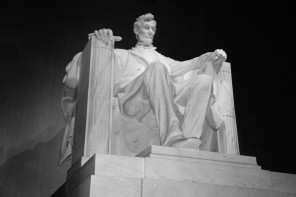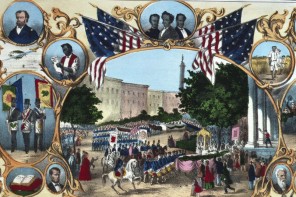North Carolina House members have passed a constitutional amendment to the state’s constitution to ban same-sex marriage. The Senate is expected to pass it as well, putting it on the ballot next May. (UPDATE: The measure passed the Senate this afternoon.)
North Carolina had, so far, been the only state in the Southeast to resist such a discriminatory amendment to their constitution, thanks to Democratic control of their legislature. Now that Republicans rule the roost, the measure has passed, even as the state’s unemployment rate is 10.1 percent.
House Majority Leader Paul Stam, R-Wake opened the floor debate this way: “The question is are we going to let the people decide, or judicial decisions based on the Supreme Court decisions of a half-dozen other states?”
Which is interesting because Stam would not allow any actual public debate of the bill before it was passed.
The bigger problem, however, is this whole trend on the religious right to “let the people vote” when it comes to the rights of their fellow gay and lesbian citizens. Since we don’t actually live in a true democracy (where all the people get to vote on everything), but instead live in a representative republic (where we elect and appoint people to set laws and standards for us), this red herring is especially pernicious.
As we have seen from the recent Republican presidential candidate debates, if we actually let the people vote on what rights and privileges other citizens would enjoy, the people might implement a mandatory death penalty (possibly even for lessler infractions than murder if given the chance), and perhaps vote away the right for anyone poor to enjoy government-funded health care. Perhaps they would even vote to outlaw poverty and toss those layabouts into jail or “work camps,” as the satire site Freewood News recently suggested.
The fact of this country is that we don’t get to vote on the rights of others. If we did, then the end of slavery, implementation of women’s rights, and equality for different races might never have come about. The reason we have these measures (which some like Rand, and his dad Ron, Paul, would like to see rolled back) is because of actions by the constitutionally established courts and legislatures. The courts and the legislatures—when they work—exist to move a society forward, through their collective fears and prejudices, into a more equitable world.
After the vote in the North Carolina House, Rev. Patrick Wooden of the Upper Room Church of God in Christ in Raleigh told an anti-gay rally: “This state has to protect God’s holy institution as it is currently defined in state law.”
I seriously doubt Rev. Wooden would be standing before an anti-poverty rally insisting that the state (or heaven forbid, the federal government) protect God’s holy law on how we treat the poor. (You know, that whole “we are our brother’s keeper” thing.) Again, the Republican presidential debates have revealed that while conservatives hate having the government in their wallet, or telling it who can get insurance, or who can eat at their lunch counters, they love having big brother’s brawn when it comes to controlling other people’s sex lives—be they gay, lesbian, or in need of an abortion.
Thankfully, not every religious person in North Carolina thinks as Rev. Wooden does.
The Rev. Susan Parker of Wake Forest Baptist Church told the more than 250 people who gathered at Grace Court Park that she was thankful she was not the lone ministerial voice.
“Gathered here tonight are other clergy who also believe every person is created in God’s image and that none of God’s children should be legislated against, as though they are not whole, as though they are not deserving of equality under the law,” she said.
Perhaps, though, letting the people vote will finally put this issue to a rest in North Carolina. Polls show the amendment’s strict language is turning off the voters. Fifty-five percent said they’d vote against the amendment, while only 37% favor it. Among Democrats 63% oppose with 52% of independents saying they’d reject it. Even 47% of Republicans say they dislike the measure.
So, what happens to the conservative Christian argument if the people do vote — and reject discrimination?




